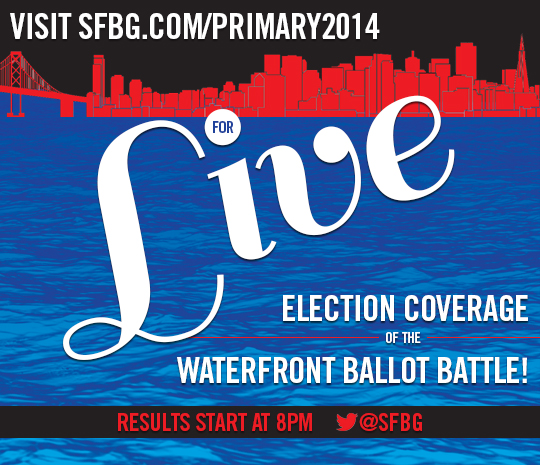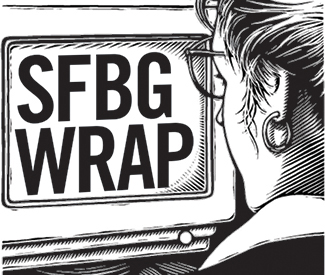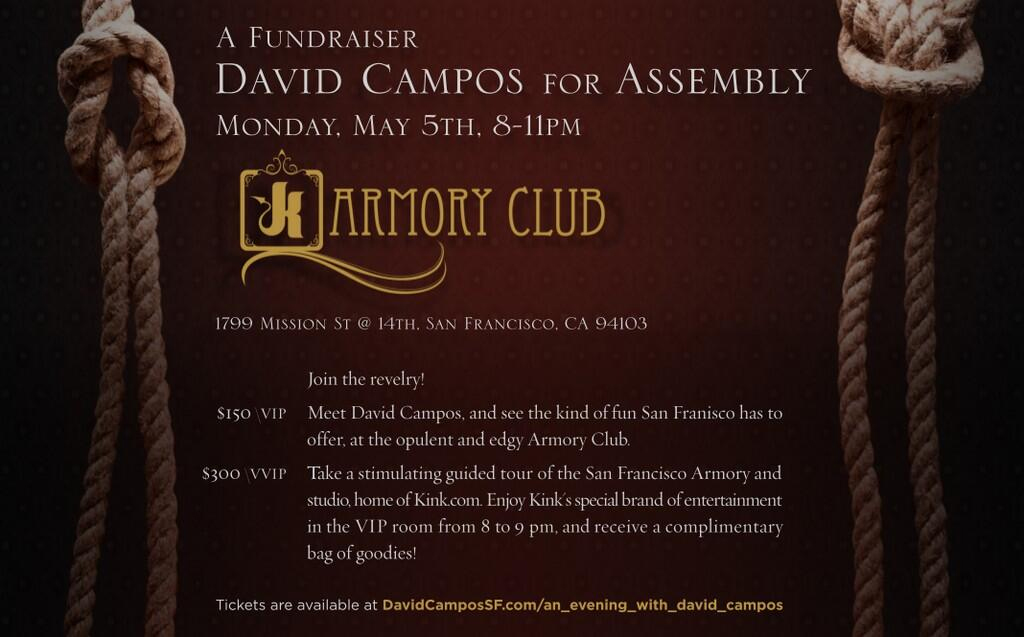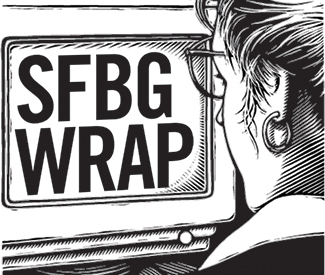rebecca@sfbg.com
The Golden State Warriors’ announcement that its planned 18,000-seat basketball arena would be moved off the San Francisco waterfront was fresh in everyone’s mind when former San Francisco Mayor Art Agnos visited the Bay Guardian office on April 23, and he was electrified by the win.
“I resent anyone suggesting that this is not a genuine people-powered victory — again,” Agnos said. “Because that’s what it was, bottom line.”
The former mayor has traveled up and down the city in recent months promoting Proposition B, an initiative on the June 3 ballot that may well have cleared the Warriors Arena from its proposed waterfront perch at Piers 30-32 had the team not announced that it would be taking that step independently.
If it passes, Prop. B will require voter approval for any development project along city-owned waterfront property that exceeds height limits set by the Waterfront Land Use Plan approved in 1997. Such a rule would have squarely targeted the Warriors’ proposal.
The sports arena had been slated for a 13-acre parcel a stone’s throw from the Bay Bridge that is now a parking lot, where it would have hovered above the water like a floating spacecraft. Across the street, at a site known as Seawall Lot 330, the Warriors had proposed installing shops, parking, a condo tower, and a hotel.
Agnos and the backers of Prop. B hadn’t anticipated the Warriors’ announcement that its waterfront venue would be moved to private property, a 12-acre lot in Mission Bay purchased from tech giant Salesforce.com.
“We thought, because people at the top of this city’s government told us so, they would prevail,” Agnos said of Mayor Ed Lee and others championing the waterfront arena. “They didn’t.”
Agnos and his allies say it was the prospect of voters having to sign off on a proposal that was hatched behind closed doors that caused the Warriors to choose a more appropriate location.
“We helped them go to a different place where we now support what they’re doing — because it makes more sense for this city, and for our bay, as well as our waterfront. That’s what the issue is,” Agnos told us. “The spin doctors had their ass handed to ’em … had their ass handed to ’em, by a low-income group of allies, over their $20,000–$30,000, gold-plated contracts per month. And so now, they understand.”
They understand that the waterfront of San Francisco is a battleground and the people are willing to fight to ensure the public interest trumps private profits.

A rendering of proposed development at Pier 70, envisioning tech offices and housing.
PRECIOUS PARCELS
A historic map hanging in a corridor at the Port of San Francisco building, in a rehabbed terminal at Pier 1 along The Embarcadero, traces the original curve of a coastline that once separated the city from San Francisco Bay.
The existing waterfront juts out considerably from where its natural edge once fell, and today’s urban landscape features a mix of entire neighborhoods, tall buildings, parks, restaurants, merchant corridors, and transport terminals, all perched atop fill covered by layers of concrete.
Its shipping days long gone, much of San Francisco’s human-constructed waterfront now serves as a draw for visitors, the iconic subject of countless tourist photographs. But at other locations along the shoreline, vacant waterfront parcels are hotly contested land-use battlefronts.
“We’re clearly in a period of significant controversy,” the Port’s Special Project Manager Brad Benson told us. The Warriors Arena, Benson said, had been an opportunity for the Port to rehabilitate and generate revenue from Piers 30-32, which originated as two finger piers constructed in 1912, joined by a concrete slab in the 1950s.
Despite being in control of some of the most valuable real estate along the West Coast, the Port of San Francisco remains in a perpetual financial pinch, due to its need to fix up crumbling piers and aging infrastructure. The Port is governed by a Waterfront Land Use Plan, outlining possible uses for each parcel, and it also conducted a survey to identify properties that could be developed to help generate revenue.
“The Port has a big capital need,” Benson said, noting that many of the “piers and buildings were beyond their useful life when they were transferred to the city” from the state in 1968. Facing nearly $2 billion in capital needs, the Port’s modus operandi is to seek out private developers to partner with on development projects for parcels under its ownership, in order to secure funding that would go toward backlogged improvements.
That didn’t happen with the Warriors, however — the sports team approached the city out of the blue, and the project quickly won the fervent backing of Mayor Lee, who has appointment power over the five-member commission that governs the Port. At one point, Lee even claimed that this flashy sports arena would be his “legacy project.”
To longtime grassroots activists who are deeply involved in how land-use decisions are made on valuable waterfront parcels, it looked to be yet another example of what Prop. B supporter Jennifer Clary called “kneejerk development” — out of sync with carefully thought out shoreline planning efforts.
“The Port gets jerked around by every mayor,” said Clary, president of San Francisco Tomorrow, part of the coalition backing Prop. B. “Every mayor comes up with some stupid project.” She ticked off a list of failed waterfront developments (such as Mills Mall, proposed for Piers 27-31; and a 50-story U.S. Steel Building that would have towered over the Ferry Building), only to have them voted down or halted by grassroots neighborhood activists who viewed them as inappropriate designs fueled by greed and greased by political connections.
Behind the objection to Prop. B, Clary added, “is that the mayor will have to think a little more” before backing projects of this nature.
Whether opponents of the Warriors Arena plan looked at it and saw a traffic nightmare, an inappropriate use of public land, or a bad financial deal for a city needing to contend with ever-growing pressures on its critical infrastructure, members of the coalition that’s backing Prop. B feared the public would have little sway when it came to the final decision-making. A bid to restore that balance, by arming voters with veto power under the law, was the impetus behind Prop. B.
City Hall has ignored the will of regular folks who collectively own Port land along the shoreline, said Agnos, campaign consultant Jon Golinger, and Prop. B proponent and Sierra Club volunteer Becky Evans — listening only to the Mayor’s Office and deep-pocketed developers who stand to make millions by building on extremely valuable land that’s held in the public trust under California law.
“The people are putting the developers in touch with the values of this city, and what we want in this city,” Agnos said, thumping his index finger on the table to emphasize the point. “Prop. B puts people in the room who have not been there, and now [developers] have to pay attention.”
The task of developing Piers 30-32 would have required expensive substructure modification, requiring the involvement of bureaucratic agencies such as the US Army Corps of Engineers, the Bay Conservation Development Commission, and the State Lands Commission. The Warriors estimated that it would invest $120 million in improvements such as seismic upgrades and an elevation grade to deal with the looming problem of sea-level rise, but the threat of having to win voter approval represented yet another hoop to jump through. So when a new option opened up offering greater certainty, the Warriors pulled the plug on Piers 30-32.
Even though Lee’s “legacy project,” the main physical target of Prop. B, is no longer a factor in the June election, backers of the initiative say the measure is still important to restore democratic balance in a development process that freezes out ordinary citizens. Opponents, meanwhile, say the initiative threatens to undermine a complex planning process that engages the public and needn’t be tampered with.
IN THE PIPELINE
Prop. B would prohibit city officials from approving taller buildings than are currently allowed under zoning for Port-owned waterfront parcels, unless voters give those height increases a green light at the ballot box.
Since many of the properties in question are already built out, or preserved by historic landmark designation, Prop. B would impact only a handful of waterfront lots that remain in play as potential sites for new development. Among them are Piers 30-32 and Seawall Lot 351, the site of the 8 Washington luxury condo tower that the electorate flushed down the tubes in a decisive ballot referendum vote last fall, despite Board of Supervisors’ approval.
The same group that opposed 8 Washington launched Prop. B. Last year’s ballot referendum — also named Prop. B, and buoyed by the campaign slogan No Wall on the Waterfront — asked voters whether they favored increasing building heights above the zoning limit at the waterfront site where the luxury condo project would have gone.
San Francisco voters, in no mood to support a high rise for the superrich at a time when anger over skyrocketing rents was bubbling over and droves of low-income residents were being edged out by eviction, shot it down. Many political observers took the outcome as a signal that City Hall politicians are out of touch with voters.
Simon Snellgrove, the developer of the failed 8 Washington project, is reportedly working on a new building design. But since any new plans for 8 Washington are embryonic at best, and the fate of Piers 30-32 is anyone’s guess, the Prop. B ballot measure has immediate implications for two waterfront developments in particular.
One, on and around Pier 48, is being pushed by the San Francisco Giants. The other lies farther south, at Pier 70, a sprawling strip of waterfront that runs behind Illinois Street, from The Ramp restaurant at Mariposa to the old Potrero Power Plant.

The Giants’ planned development would be a short distance from AT&T Park.
During World War II, some 18,500 workers built ships at Pier 70 for the war effort, in brick and metal warehouses that still stand vacant and dilapidated. The site also housed a coal-fired power plant that was later converted to natural gas, leaving behind toxic residue that is up to Pacific Gas and Electric Co. to remediate. Farther north along Pier 70, BAE Systems conducts ship repair, a task that has been performed at the site since 1868.
Today, a 28-acre parcel of Pier 70 that is proposed for development by Forest City is home to nothing more than pigeons, feral cats, and the occasional hawk that swoops into a cavernous metal-roofed structure that stands near the waterfront and dates back to 1941, barely visible from the street. Someday in the not-so-distant future, developers imagine it will be populated with tech office workers (Google is used as an example of an anchor tenant in slides presented to the city), makers and small vendors, and thousands of residents who would call the place home.
The site is zoned with a 40-foot height limit, but developers are considering plans with a range of building heights that would be on a similar scale to Mission Bay. Part of the improvements to the property will require raising the elevation grade to deal with sea-level rise. Forest City has planned for a minimum of around 1,000 residential units — the majority market-rate, but with a mix of affordable housing as well.
Representatives from Forest City said that if Prop. B passes, “We’ll be prepared to seek voter approval with a dynamic project guided by … a community-based master plan,” and had not taken an official stance on the ballot measure. If voters were to reject an increase of the 40-foot height limit at the site, which is zoned for heavy industry, the project would no longer be financially feasible.
GIANT TOWER SCRUTINIZED
At Seawall Lot 337, a parcel near the Giants’ stadium which is primarily used as a parking lot during baseball games, the team is backing a project that would include 3.5 million square feet of new residential, office, and retail development, possibly including a 380-foot tower. Across the way at Pier 48 would be a new Anchor Steam brewery, and about five acres of open space.
The Giants plan resulted from the Port’s request for potential development partners to submit bids for that property, which went out in 2007.
“They very quietly have been pushing a plan that Prop. B made public,” Golinger said of the Giants’ plans. “They screamed at everyone involved in our coalition during the signature drive to get us to drop it. They funded a lawsuit … to get it kicked off the ballot.”
The Guardian independently confirmed that the team is part of the group that has challenged Prop. B in court. That legal challenge was unsuccessful in getting the initiative struck from the June ballot, but a judge could take up the question again if Prop. B is approved.
The parcel where the Giants have pitched a rental housing, office, and retail complex with a maximum height limit of 380 feet is zoned with a height limit of zero, zoned for open space in city plans. Nevertheless, “The [Port’s request for qualifications] called for developing up to 300 feet,” Benson explained, calling the current zoning “a remnant of the old Mission Bay plan,” which envisioned a park with wetlands and open space. The Port’s request for proposals went out after a subcommittee was formed, and public hearings were held on the design plans.
Asked why the Port would bake such a tall height limit into its RFQ, Benson responded, “There was a desire to avoid replicating the heights at Mission Bay,” the nearby redevelopment area characterized by lower, boxy buildings that seem to be universally regarded as ugly and lacking charm.
Few people are as intimately familiar with Mission Bay as Corinne Woods, whose houseboat is enveloped on either side by the sprawling development. When Woods first claimed a berth at Mission Creek for her floating home in 1985, “it was surrounded by open empty fields, abandoned warehouses, and lots of fennel,” she said. “We had wonderful parties.”
Outside her dock just off Channel Street is a community garden, a strip of green space shaded by willow and eucalyptus trees where night herons take refuge. Just beyond that is the Mission Bay South redevelopment area, a sprawling construction site that’s ushered in building cranes, swirling dust, pile drivers, and more recently, a five-alarm blaze that required the entire Fire Department to extinguish.
The fledgling neighborhood that now occupies the already-built part of Mission Bay might as well have dropped out of the sky, and the building profiles are wide and flat. “I would rather see slim, articulated towers, with more open space,” Woods admitted.
In the years between 1985 and today, Woods has fought the Port on behalf of her live-aboard community to be allowed to remain floating in place, becoming an unlikely expert on the byzantine process of waterfront planning along the way.
As a key member of half-dozen or so community advisory groups formed to weigh in on major waterfront developments, Woods has ardent faith in the civic engagement aspect of the planning process. She fears Prop. B could upset years of careful neighborhood negotiations by limiting the discussion to nothing more than a conversation about height limits.

Corinne Woods opposes Prop. B.
Woods is a plaintiff in the lawsuit the Giants are funding to challenge Prop. B, aligned with developer-friendly housing activist Tim Colen and building trades head Michael Theriault on the side that opposes Prop. B. But despite the millions of dollars that are on the line, Woods insists she has no dog in this fight. “I can’t even get free tickets to Giants games,” she said.
She does hope for the five-acre park that the Giants plan would install as part of the Seawall 337 / Pier 48 plan, a short walk from her houseboat. But she says her opposition to Prop. B is rooted in her experience of a traditional planning process that rewards neighbors who have the patience to sit through hours of grueling advisory group meetings with negotiating power vis-à-vis developers. Asked directly what the problem is with letting voters weigh in, Woods responded, “Because they don’t know what the fuck they’re talking about!”
But that leave-it-to-the-experts attitude is just the thing that Prop. B’s backers say is dangerous for waterfront planning, since it places final decision-making in the hands of profit-seeking real estate interests, a public agency in dire need of funding, and a mayor with political ties to developers.
THE HOUSING QUESTION
Given that the thrust of Prop. B is to democratize the planning process, few are in a hurry to align themselves with the formal No on B campaign — most of the opposition money seems to have been funneled into the Giants’ lawsuit, even though the Giants have officially taken a neutral stance on Prop. B. However, the message from opponents of Prop. B is that the initiative would kill sorely needed housing.
The Port of San Francisco, which is legally barred from taking a position on the initiative, reported in a February analysis to the Department of Elections that it could have the effect of leaving between 1,990 and 3,690 new housing units “delayed, reduced, or abandoned,” including between 268 and 596 affordable units. Those figures are based on early project proposals brought by the Warriors, the Giants, and Forest City, assuming those planning proposals would be “delayed by a need for a vote, or rejected by the voters” under a Prop. B regime.
A nonbinding Giants term sheet notes that the team would build rental housing, 15-20 percent of those units affordable, while Forest City’s Pier 70 proposal includes 1,000 new housing units with on-site affordable that would exceed the 12 percent required under city law.
Targeting housing “is a scary message,” campaign consultant Golinger said, charging the opposition with preying on voters’ fears to encourage people to vote down a measure that would democratize waterfront planning.
“This myth that we’re trying to stop housing is just that,” Agnos chimed in. “It’s just a political ploy by those who want to build high-end, high-rise, luxury condos — a la 8 Washington, a la Giants — on public property.”
The housing question is key. At a time when so many people are facing eviction or being priced out, the refrain that building more housing is the only solution to relieve pressure is oft-repeated, particularly by developers. However, these projects would introduce far more market-rate units than affordable projects, plopping down well-to-do neighborhoods in spaces that have sat on the margins in recent history, further changing the social character of the city. And proponents of Prop. B question whether the waterfront is really the right place to add new affordable units.
Meanwhile, the affordable housing community seems to be aligned in its support of Prop. B. The San Francisco Tenants Union, the Affordable Housing Alliance, the AIDS Housing Alliance of San Francisco, and other organizations that have aligned to push for stronger tenants’ rights and promote affordable housing have all endorsed the measure.
WHO DECIDES?
Given the popularity of a measure that fundamentally seeks to democratize the planning process, all development teams with skin in the game have declined to take a position on the measure. So have Mayor Lee and Board of Supervisors President David Chiu, who each played significant roles in recent waterfront battles, with Lee championing the Warriors Arena and Chiu opposing 8 Washington and assisting with the signature-gathering effort to stop it.
Sup. David Campos, in contrast with Chiu and Lee, has taken a stance on Prop. B. In a recent interview, he outlined his reasons for supporting it.
“I think that something has happened in City Hall, where I think the approval process is such that it has led to certain projects being approved that don’t really reflect the reality of what this city needs, and that have truly left the public out of the process in a meaningful way,” Campos told us. “And 8 Washington passed 8-3 at the Board of Supervisors, with a supermajority. The fact that the voters overwhelmingly rejected that project tells you that there has been a disconnect between what the board and folks in City Hall are doing, and where the public actually is.” To correct that imbalance and allow more San Franciscans to shape the city’s waterfront, Campos said, “I think it’s appropriate for us to go to the ballot and let the voters decide.”













